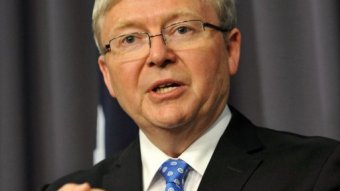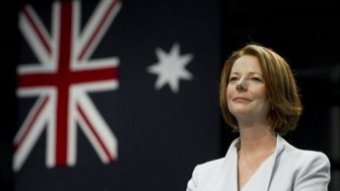www.aljazeerah.info
News, June 2013
Archives
Mission & Name
Conflict Terminology
Editorials
Gaza Holocaust
Gulf War
Isdood
Islam
News
News Photos
Opinion Editorials
US Foreign Policy (Dr. El-Najjar's Articles)
www.aljazeerah.info
|
Editorial Note: The following news reports are summaries from original sources. They may also include corrections of Arabic names and political terminology. Comments are in parentheses. |
Kevin Rudd Sworn in as Australian Prime Minister After Toppling Julia Gillard
 |
 |
| Kevin Rudd | Julia Gillard |
France 24, June 27, 2013
Rudd sworn in as Australian PM after toppling Gillard
Australia's former leader Kevin Rudd was sworn in as prime minister on Wednesday after ousting Julia Gillard in a party vote just months ahead of presidential elections, and almost three years to the day since he was toppled from the job by Gillard.
Kevin Rudd has wrenched back the job of Australian prime minister from the former deputy who took it from him three years ago, possibly just in time to lead his party to a defeat in upcoming elections.
He was sworn in on Thursday and urged fellow lawmakers to be “a little kinder and gentler” towards each other following the internal coup that ousted Julia Gillard, the country’s first woman prime minister.
Rudd, a Mandarin-speaking former diplomat, forced Gillard out on Wednesday in nearly the same way she ousted him in 2010. Each faced a party leadership vote in the face of a revolt from Labor Party lawmakers, but while Rudd did not contest Gillard’s earlier challenge, she went ahead with a vote that she lost 57-45.
Gillard tendered her resignation on Wednesday night.
In a brief statement to Parliament two hours after he was sworn in as national leader, Rudd praised Gillard’s “major reforms” on issues such as industrial law and school literacy testing, as well “her great work as a standard bearer for women.”
Rudd’s ouster had created a rift in the Labor Party and endless infighting. He had tried twice previously to oust Gillard, last year and in February. Many took the fact that he never posed for a Parliament House portrait, as other former prime ministers had done, as a sign that he never gave up on returning.
“As we all know in this place, political life is a very hard life; a very hard life indeed,” Rudd told Parliament.
“Let us try – just try – to be a little kinder and gentler with each other in the further deliberations of this Parliament,” he added.
Rudd’s way back to leadership was paved with the Labor Party’s dismal opinion polling under Gillard, ahead of elections she had set for Sept. 14 but that Rudd could schedule as early as Aug. 3. Australians favor Rudd over Gillard, and while the conservative opposition is still favored to win the next election, Rudd’s leadership could help avoid a landslide defeat.
Rudd had warned that Labor was facing its worst election defeat under Gillard’s leadership in the 111-year history of the Australian federation.
Gillard lacked Rudd’s charisma, and although many Labor lawmakers preferred her style, her deepening unpopularity among voters compelled a majority to seek a change.
Opposition leader Tony Abbott demanded an explanation from Rudd of why Gillard was deposed with elections looming. Abbott also called for an election date to be confirmed.
“Politics is a tough business and sometimes it is far more brutal than it needs to be,” Abbott said.
“This is a fraught moment in the life of our nation. A prime minister has been dragged down; her replacement owes the Australian people and the Australian Parliament an explanation,” he added.
Rudd’s office could not immediately confirm whether Rudd would replace Gillard in a visit to Indonesia that had been scheduled for next week.
Governor-General Quentin Bryce commissioned Rudd as prime minister on Thursday, what is likely to be Parliament’s last day before elections.
Anthony Albanese was sworn in as deputy prime minister and Chris Bowen was sworn in as treasurer during the same ceremony. Rudd has yet to say when he will announce his complete Cabinet after seven ministers resigned following Gillard’s ouster.
Rudd faces a potential no-confidence vote in Parliament. He probably would survive it, but a loss could trigger an election as early as Aug. 3.
Bryce revealed that she took late-night legal advice on whether she should swear in Rudd. A minority government such as Gillard led has not been seen in Australian federal politics since World War II, and Labor’s leadership change raised unique constitutional questions.
While Rudd has the support of his party, Labor has just 71 seats in the 150-seat House of Representatives. Gillard was able to govern with support from some independents and the minor Greens party. They are not obligated to support Rudd, though he did get the backing of at least two independent lawmakers who had not supported Gillard.
Rudd’s statement fulfilled a condition set by Bryce that he quickly notify Parliament of his appointment so that lawmakers had an opportunity to take action.
Gillard said after her loss Wednesday that she was proud of her government’s achievements, including the introduction of an unpopular carbon tax paid by the biggest industrial polluters. She had been dogged by her pre-election promise never to introduce such a tax.
Gillard’s gender was a focus several times during her tenure, and she made international headlines for calling Abbott a misogynist.
She said Wednesday that because of her tenure, “It will be easier for the next woman and the woman after that and the woman after that. And I’m proud of that.”
(AP)
Australian PM Gillard ousted by Rudd in party vote
Australia's former leader Kevin Rudd toppled Julia Gillard to return as prime minister on Wednesday, following a Labor Party vote which saw Rudd win 57 votes to Gillard’s 45. Gillard will quit politics after national elections in September.
When Kevin Rudd was swept to power as Australian prime minister in 2007, the Mandarin-speaking former diplomat was the largely unknown but seemingly genial face of progressive politics.
Six years later, Australians know him now as a ruthless adversary who waged a three-year leadership struggle to topple Julia Gillard after she ousted him amid plummeting Labor support in 2010.
“The truth is if we are all being perfectly honest about it right now is that we are on course for a catastrophic defeat, unless there is change,” said Rudd before being restored to the prime ministership by Labor lawmakers desperately hoping he can help avert an expected September 14 election thrashing.
Rudd, 55, knows better than anyone the monumental job facing his party to regain the trust of voters who polls show have grown weary of Labor infighting.
He was the architect of widely unpopular new carbon and mining taxes that fuelled perceptions of Labor incompetence that gave rise to minority government in 2010, while also softening border protection laws favoured by many voters.
Rudd also has to regain the trust of his own bitterly-divided party, in which many MPs switched allegiance to Gillard in the first place in frustration over his imperious leadership style and often chaotic decision making.
Political insiders joke that while Gillard was liked least by those furthest from her office – voters – Rudd is liked best by those who have never had to work with him.
“This is a programme – a jihad of revenge – the like of which we’ve never seen before in the history of Australian politics and it goes beyond the normal human reaction of revenge,” former Labor leader Mark Latham, who has left parliament, told ABC television. Rudd’s constant campaigning, he said, had split the party and was close to “evil”.
Rudd has tried to mend fences and promised lawmakers there would be no fallout from the leadership battle.
“Everyone makes mistakes,” a candid Rudd said at a Sydney Catholic college this month, in a speech interpreted as reaching out to disgruntled party members with a promise of change.
“One of the things that I have been slow to learn is the importance of simply privately and publicly acknowledging the good work of others.”
The switch to Rudd may be too little too late for Labor.
Polls show Labor facing a defeat of huge proportions with the loss of up to 35 seats in the 150-seat lower house, which would likely take the centre-left party a generation to recover from, worse than its last period in the wilderness between 1996 and 2007.
A Newspoll in the Australian newspaper this week was the latest to show the conservatives leading the government, with 57 percent support compared to 43 percent for Labor. Rudd was preferred over Gillard by 58 percent of voters.
Opposition leader Tony Abbott has promised to curb government spending if he wins power, as well as scrap Rudd’s carbon emissions tax which many Australians blame for driving living costs to among the world’s highest levels.
Failure to deliver a political revival could see Rudd, who grew up in poverty but is now married to a millionaire businesswoman, lumbered with much of the blame for fuelling the instability that now threatens to culminate in defeat.
Rudd is used to overcoming adversity. The youngest of four children, Rudd grew up in a small country town in the northern state of Queensland.
Poverty shaped Rudd’s views
His life
was thrown into turmoil at age 11, with the death of his father
in a car crash. The family was forced off the dairy farm their
father ran but did not own, shaping Rudd’s early political views
on the value of welfare.
“When my father was accidentally killed and my mother, like thousands of others, was left to rely on the bleak charity of the time to raise a family, it made a young person think,” Rudd said in his first speech to parliament in 1998.
As a teenager, Rudd threw himself into school work, reading transcripts of parliamentary debates in his spare time. He became a champion debater and was dux, or top student, of his high school. He also joined the youth wing of the Labor Party.
Rudd mastered Chinese language, culture and politics at the Australian National University in Canberra, where his tutors described him as serious and self-disciplined, and joined Australia’s diplomatic service after graduation.
Rudd won a seat in parliament in 1988, building a national profile with spots on morning television, where he would spar with junior ministers about the political issues of the day. He returned to TV to build momentum for his challenge to Gillard.
But his restless ambition has never waned, made clear by his maiden speech in parliament.
“I have no intention of being here for the sake of just being here. Together with my colleagues it is my intention to make a difference,” he said. “Politics is about power.”
(REUTERS)
Fair Use Notice
This site contains copyrighted material the
use of which has not always been specifically authorized by the copyright
owner. We are making such material available in our efforts to advance
understanding of environmental, political, human rights, economic,
democracy, scientific, and social justice issues, etc. We believe this
constitutes a 'fair use' of any such copyrighted material as provided for
in section 107 of the US Copyright Law. In accordance with Title 17 U.S.C.
Section 107, the material on this site is
distributed without profit to those
who have expressed a prior interest in receiving the included information
for research and educational purposes. For more information go to: http://www.law.cornell.edu/uscode/17/107.shtml.
If you wish to use copyrighted material from this site for purposes of
your own that go beyond 'fair use', you must obtain permission from the
copyright owner.
|
|
|
|
||
|
||||||


